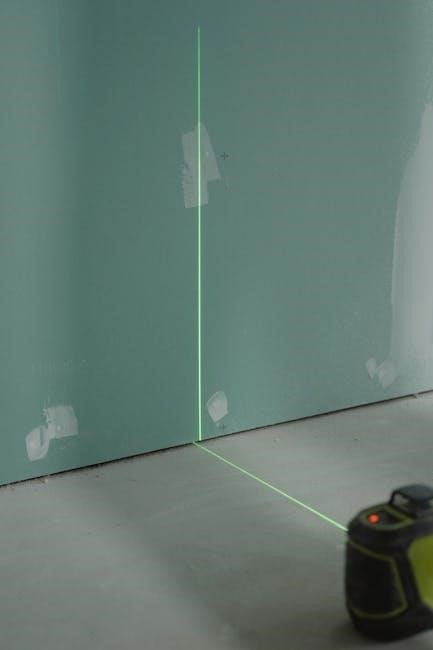how to rent guide 2023 pdf

The How to Rent Guide 2023 is a comprehensive government resource for tenants and landlords‚ offering insights into the private rental sector in England and Wales.
Updated for 2023‚ it provides essential advice on rights‚ responsibilities‚ and best practices‚ ensuring a smooth rental experience for all parties involved in the process.
Overview of the Guide
The How to Rent Guide 2023 is a detailed resource designed to navigate the rental process in England and Wales. It covers essential topics such as understanding tenancy agreements‚ deposit protection‚ and legal responsibilities. The guide is tailored for tenants and landlords‚ offering practical advice to ensure a smooth rental experience. It includes checklists‚ rights‚ and obligations‚ making it a vital tool for anyone involved in the private rented sector. Regular updates ensure the information remains current and relevant.
Importance of Understanding the Rental Process
Importance of Understanding the Rental Process
Understanding the rental process is crucial for both tenants and landlords to ensure a smooth and legally compliant experience. It helps tenants avoid pitfalls‚ such as unfair terms or unsafe conditions‚ while enabling landlords to meet their legal obligations. A clear grasp of the process fosters transparency‚ trust‚ and mutual respect. By familiarizing themselves with key steps and requirements‚ all parties can navigate the rental journey confidently‚ avoiding disputes and ensuring a positive outcome for everyone involved in the tenancy. This knowledge is essential for a hassle-free experience.

Preparing to Rent
Preparing to rent involves assessing your financial capacity‚ understanding tenant rights‚ and gathering necessary documents to ensure a smooth rental process from start to finish.
Assessing Your Budget and Requirements
Assessing your budget and requirements is crucial for a successful rental experience. Start by evaluating your income and expenses to determine affordable rent limits. Consider additional costs like utility bills‚ council tax‚ and deposits. Check if your deposit is protected under a government-backed scheme. Understand your legal obligations as a tenant and ensure you meet the landlord’s criteria. Evaluate your lifestyle needs‚ such as location‚ amenities‚ and property type‚ to find a home that fits your preferences and budget effectively.
- Calculate total affordability‚ including all related expenses.
- Verify deposit protection schemes and legal obligations.
- Align property features with personal lifestyle needs.
Understanding Your Rights as a Tenant
As a tenant‚ it’s essential to understand your rights under the law. The How to Rent Guide 2023 outlines protections against unlawful eviction and ensures landlords meet safety and maintenance standards. Tenants have the right to live in a property with proper gas and electrical certificates. Deposits must be protected in a government-approved scheme‚ and tenants must receive a written tenancy agreement. Familiarize yourself with these rights to avoid disputes and ensure a fair rental relationship.
- Know your legal protections against eviction.
- Ensure safety standards are met by landlords.
- Understand deposit protection obligations.

Finding a Rental Property
Finding the right rental property requires a clear strategy and understanding of the market. Prioritize your needs‚ research areas‚ and use online platforms for real-time listings and alerts.
Effective Strategies for Property Searching
To effectively search for a rental property‚ prioritize locations that meet your lifestyle needs‚ such as proximity to work‚ schools‚ or public transport. Use online platforms and estate agent websites to filter properties by price‚ size‚ and amenities‚ ensuring efficiency in your search. Regularly check listings for new additions and consider setting up alerts for properties that match your criteria.
Additionally‚ network with local agents and landlords to uncover off-market opportunities. Visit neighborhoods of interest to spot “To Let” signs and engage with local communities for recommendations. By combining digital tools with proactive outreach‚ you can identify suitable properties quickly and make informed decisions. This balanced approach maximizes your chances of finding the right home.
Using Online Platforms and Estate Agents
Online platforms like Rightmove and Zoopla offer extensive property listings‚ enabling renters to filter by location‚ price‚ and amenities. These tools provide high-quality images‚ virtual tours‚ and detailed descriptions‚ helping tenants assess properties remotely. Additionally‚ estate agents specialize in local markets‚ offering valuable insights and access to properties that may not be advertised online.
By leveraging both online resources and agent expertise‚ renters can streamline their search and identify suitable properties efficiently. This dual approach enhances the likelihood of finding a home that aligns with their needs and budget.

Viewing Properties
Viewing properties is a critical step in the rental process‚ allowing tenants to assess the condition‚ safety‚ and suitability of a home before committing to a tenancy.
During viewings‚ tenants should inspect for damages‚ check functionality of appliances‚ and ensure compliance with safety standards‚ such as working smoke alarms and secure locks.
Key Things to Look for During Viewings
When viewing properties‚ tenants should prioritize checking the condition of the property‚ ensuring it is safe and well-maintained. Look for any signs of damage‚ damp‚ or structural issues. Check the functionality of appliances‚ heating systems‚ and plumbing. Verify that all safety features‚ such as smoke alarms and carbon monoxide detectors‚ are present and operational. Assess the overall cleanliness and layout to ensure it meets your needs. Additionally‚ review any provided documentation‚ such as gas safety certificates‚ to ensure compliance with legal requirements.
Assessing the Condition of the Property
When assessing the property’s condition‚ check for any signs of damage‚ wear‚ or needed repairs. Inspect walls‚ floors‚ windows‚ and doors for structural integrity and functionality. Ensure the plumbing and electrical systems are in good working order‚ and look for any evidence of damp or mold. Test all fixtures and appliances to confirm they are operational. Additionally‚ check for pest infestations or signs of vermin. Documenting these observations will help you understand the property’s state and avoid potential disputes later. This step ensures you are fully informed before committing to a tenancy agreement.

Making an Offer
Making an offer involves reviewing the lease terms‚ negotiating rent‚ and ensuring clarity on deposits. It’s crucial to understand your obligations before finalizing the agreement.
How to Secure a Rental Property
To secure a rental property‚ tenants should act promptly by reviewing and understanding the lease terms thoroughly. Ensure all clauses are clear and agreed upon. Negotiate terms if necessary‚ and confirm the deposit amount and payment methods. Providing required documents‚ such as proof of income and references‚ can expedite the process. Always ensure the tenancy agreement aligns with your needs and obligations. A well-prepared approach helps build trust with the landlord and ensures a smooth transition into the property.
Negotiating Terms with the Landlord
Negotiating terms with a landlord is a crucial step in securing a rental property. Tenants should review the lease agreement carefully and discuss any concerns or desired changes. Key areas for negotiation include rental terms‚ deposit amounts‚ and responsibilities for repairs or maintenance. It’s important to approach the conversation respectfully and professionally‚ ensuring both parties reach a mutually agreeable arrangement. Always seek legal advice if unsure about specific clauses‚ and ensure all agreed terms are documented in the final contract. This ensures clarity and protects both tenant and landlord interests.

Understanding the Tenancy Agreement
The tenancy agreement outlines the legal terms between tenant and landlord‚ including rent‚ responsibilities‚ and duration of tenancy. It is essential to read and understand it thoroughly before signing to ensure mutual understanding and compliance with legal obligations. Key clauses cover property use‚ payment terms‚ and termination conditions‚ ensuring both parties are aware of their rights and duties. Always seek professional advice if unsure about any part of the agreement. This document forms the foundation of the rental relationship‚ so clarity is vital.
Key Clauses in a Tenancy Agreement
A tenancy agreement includes essential clauses such as rent details‚ property use‚ tenant responsibilities‚ and termination terms. It outlines the duration of the tenancy‚ deposit requirements‚ and repair obligations. Clauses may also cover subletting‚ pets‚ and landlord access rights. Understanding these terms is crucial to avoid disputes and ensure both parties fulfill their obligations. Always review the agreement carefully before signing‚ as it legally binds both tenant and landlord. Seeking legal advice can help clarify any unclear clauses.
What to Do Before Signing
Before signing a tenancy agreement‚ ensure all terms are clear and agreed upon. Verify the rent amount‚ payment dates‚ and property details. Check for any clauses that might restrict your rights‚ such as rules about guests or pets. Ensure the deposit protection scheme is specified. Review the property inventory to confirm its condition and document any issues. Seek legal advice if uncertain about any terms. Never sign until all negotiations are finalized and you are satisfied with the agreement.
Deposit Protection
Deposit protection schemes ensure your deposit is safeguarded. Always verify that your landlord uses a government-approved scheme to secure your funds and ensure fair returns. This is crucial for tenants.
Understanding Deposit Protection Schemes
Deposit protection schemes are essential for safeguarding tenants’ deposits. They ensure that your deposit is securely held and returned fairly at the end of the tenancy. There are three government-approved schemes in England and Wales: the Deposit Protection Service (DPS)‚ MyDeposits‚ and Tenancy Deposit Solutions (TDS). Each scheme offers protection and dispute resolution services‚ ensuring transparency and peace of mind for both tenants and landlords. Always verify that your landlord uses one of these approved schemes to avoid potential issues. This is a critical step in securing your deposit and understanding your rights as a tenant. By ensuring your deposit is protected‚ you can avoid disputes and ensure a smooth tenancy process. These schemes are mandatory for landlords‚ and tenants should always request confirmation of deposit protection within 30 days of paying. This not only safeguards your funds but also ensures compliance with legal requirements‚ providing a secure foundation for your rental agreement. Understanding how these schemes operate is vital for maintaining a positive landlord-tenant relationship and avoiding costly misunderstandings in the future. Always check for scheme certification and keep all records for your own protection. This ensures that your deposit is handled fairly and returned to you as agreed. By taking these steps‚ you can confidently navigate the rental process‚ knowing your deposit is secure. Remember‚ deposit protection is a legal requirement‚ and tenants have the right to know where their deposit is held. Stay informed and assert your rights to ensure a hassle-free tenancy experience.
Your Rights Regarding Deposits
As a tenant‚ you have the right to ensure your deposit is protected under a government-approved scheme. Landlords must legally protect your deposit within 30 days of receipt and provide you with details of the scheme used. This ensures your money is safe and disputes can be resolved fairly. You are entitled to receive a certificate proving your deposit is protected‚ which is crucial for reclaiming your money at the end of the tenancy. Always request this documentation to safeguard your rights. If your landlord fails to comply‚ you can seek legal action‚ as this is a breach of their legal obligations. Understanding your rights regarding deposits is essential for protecting your finances and ensuring a smooth tenancy experience. By knowing the rules‚ you can avoid disputes and ensure your deposit is returned fairly. Remember‚ deposit protection is a legal requirement‚ and tenants have the right to transparency and security. Stay informed to assert your rights effectively.

Inventory and Check-In
A thorough inventory is essential when moving into a rental property. It documents the property’s condition‚ ensuring clarity for both tenants and landlords. Conducting a detailed check-in helps prevent disputes over damages or missing items. Always review and agree on the inventory list before signing. Photographs and written descriptions provide a clear record. This process safeguards your deposit and ensures accountability. A proper inventory is a crucial step in protecting your interests as a tenant.
Conducting a Thorough Inventory
Conducting a detailed inventory is crucial for both tenants and landlords. It involves documenting the property’s condition‚ including furniture‚ appliances‚ and any existing damage. Use photos and videos to capture every detail. Make a written list and ensure both parties sign it. This helps prevent future disputes about damages or missing items. A thorough inventory also ensures that tenants are held responsible only for any damage they cause. Regular updates during the tenancy can maintain accuracy and fairness for both parties. Clear documentation is key to a smooth rental experience.
Documenting the Property’s Condition
Documenting the property’s condition is essential to avoid disputes. Take clear photos and videos of every room‚ noting any damage or wear. Create a written record‚ including the condition of walls‚ floors‚ appliances‚ and furniture. Both tenant and landlord should review and sign this document. Use a checklist to ensure thoroughness. This documentation serves as evidence of the property’s state at move-in‚ protecting both parties. Regular updates during the tenancy can also be helpful. Accurate records ensure fairness and transparency throughout the rental process.

Legal and Safety Requirements
Ensure compliance with gas safety checks‚ electrical inspections‚ and fire safety regulations. Install working smoke and carbon monoxide alarms to meet legal standards and protect all occupants.
Gas Safety and Electrical Checks
Landlords must ensure all gas appliances are checked annually by a certified engineer and provide tenants with a Gas Safety Record. Electrical installations should be inspected every five years. Smoke alarms must be installed on every floor‚ and carbon monoxide alarms in rooms with solid fuel appliances. Tenants should report any safety concerns immediately. These checks are crucial for compliance with safety laws and protecting occupants from potential hazards. Failure to comply can result in legal action and fines.
Fire Safety and Carbon Monoxide Alarms
Landlords must ensure working smoke alarms are installed on every floor of the property and carbon monoxide alarms in rooms with solid fuel appliances. These alarms must be tested at the start of a tenancy and annually thereafter. Tenants should report any issues promptly. Failure to comply with fire safety regulations can lead to legal action and fines. Ensuring these safety measures protects both tenants and properties from potential fire hazards and carbon monoxide risks.

Maintaining a Positive Landlord-Tenant Relationship
Regular communication‚ mutual respect‚ and prompt addressing of issues foster a positive relationship. Both parties should honor the tenancy agreement and respect each other’s rights and responsibilities.
Communication Tips for Tenants
Effective communication is key to a positive landlord-tenant relationship. Always address issues promptly and respectfully. Use email or written letters for important requests to maintain a record. Be proactive in reporting repairs or concerns to avoid larger problems. Listen to your landlord’s expectations and clarify any misunderstandings early. Keep a polite and professional tone in all interactions. Regular updates show responsibility and foster trust. Remember‚ open dialogue helps resolve disputes amicably and ensures a smooth tenancy experience for both parties.
Understanding Landlord Responsibilities
Landlords have legal obligations to ensure the property is safe and well-maintained. They must conduct annual gas safety checks‚ maintain electrical systems‚ and install working smoke and carbon monoxide alarms. They are also responsible for addressing repairs promptly‚ especially for structural issues. Additionally‚ landlords must comply with health and safety regulations and provide necessary documentation‚ such as the How to Rent Guide. Tenants should understand these responsibilities to hold landlords accountable and ensure a safe and lawful living environment throughout the tenancy.

Ending a Tenancy
Ending a tenancy involves following legal procedures‚ including proper notice periods and documentation. Tenants must ensure all obligations are met before vacating the property permanently.
Procedures for Giving Notice
Giving notice to end a tenancy requires following specific legal steps. Tenants must provide written notice‚ typically within the agreed notice period‚ as outlined in the tenancy agreement.
The minimum notice period is usually one or two months‚ depending on the tenancy terms. Landlords must acknowledge receipt and ensure the process adheres to legal standards.
Proper documentation is crucial to avoid disputes. Both parties should maintain records of all communications to ensure a smooth transition and compliance with rental laws.
What to Expect During Check-Out
During check-out‚ tenants should expect a joint inspection with the landlord or agent to assess the property’s condition against the inventory.
Any damages or deductions from the deposit will be discussed‚ ensuring transparency and fairness in the process.
Tenants must return all keys and ensure the property is clean and in good repair to avoid additional charges after the final inspection.
Additional Resources
Explore government guidelines‚ support services‚ and online tools to navigate the rental process smoothly and understand your rights as a tenant or landlord effectively.
Government Guidelines and Support
The How to Rent Guide 2023 is a key resource provided by the Department of Levelling Up‚ Housing and Communities‚ offering detailed advice for tenants and landlords.
It includes checklists‚ legal requirements‚ and tips for a smooth rental experience‚ ensuring compliance with current regulations and fostering positive landlord-tenant relationships.
Additional support‚ such as dispute resolution services and housing advice‚ is available through local authorities and official government websites‚ helping both parties navigate the rental process confidently.
Where to Seek Advice and Assistance
Tenants and landlords can access support through organizations like Citizens Advice and Shelter‚ which offer free guidance on rental matters.
The Tenants Union and local authorities also provide resources for resolving disputes and understanding legal rights.
Government websites and housing helplines are additional sources for advice‚ ensuring both parties can navigate the rental process with confidence and clarity.

Leave a Reply
You must be logged in to post a comment.